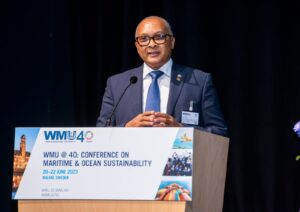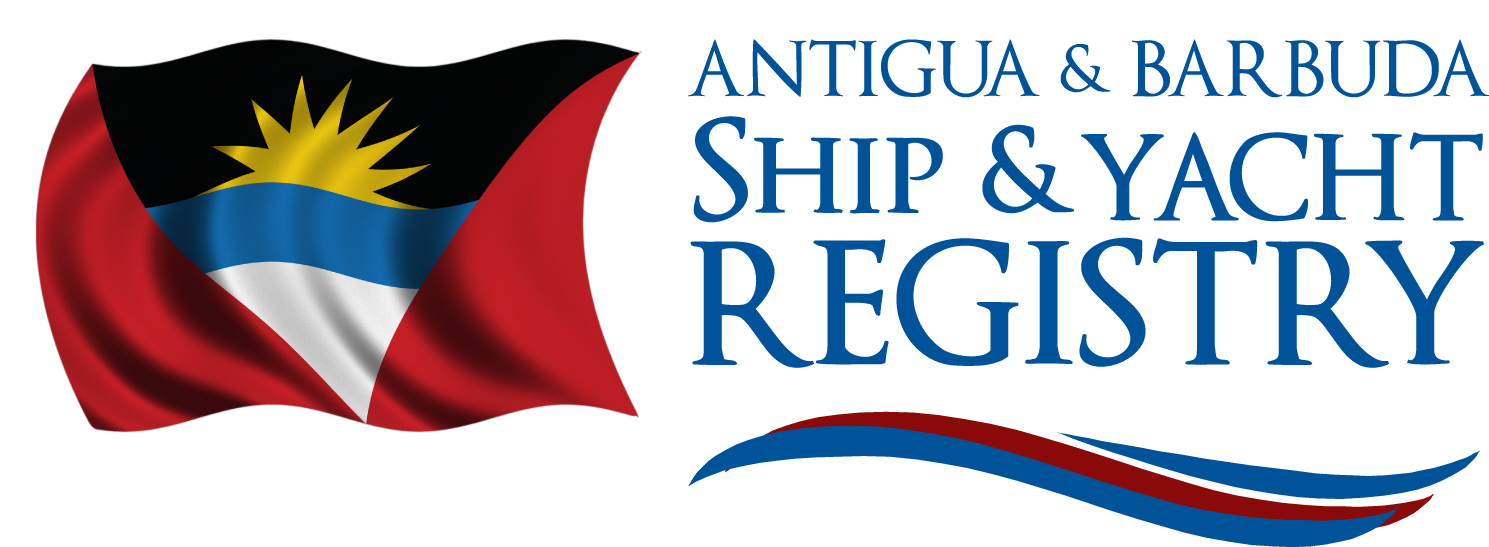
H.E. Ambassador Dwight C.R. Gardiner OBE GOM speech on the Development of a Sustainable Maritime Administration in Antigua and Barbuda on the occasion of the 40th Anniversary of the World Maritime University held in Malmö, Sweden, 20th June 2023.
Madame President, with your gracious permission, let me stand on existing protocols previously established. Ladies and gentlemen, it is particularly significant for me, as a national of a small island developing state and a graduate of this esteemed institution to talk to you about my experience on developing a sustainable modern maritime administration.
My maritime journey began in 1981 at the Antigua and Barbuda Port Authority as a deckhand on one of the harbor tugs. I subsequently availed myself of the opportunities for formal training in the sector and after obtaining a number of certificates in a variety of maritime disciplines, I joined the newly created Antigua and Barbuda Department of Marine Services and Merchant Shipping aka ADOMS in 1986, which was at the time manned by expats. My goal was to be the first Internationally trained local Director/Registrar General which I finally accomplished in 2009. I was also appointed the Permanent Representative of Antigua and Barbuda to the IMO in 2005. I was conferred with the award of Outstanding Alumnus of WMU in 2014 and appointed to the Board of Governors of WMU in 2018.
I consider the most pivotal move in my maritime career, as my enrolment in the WMU Master of Science in Maritime Safety Administration (Nautical), the class of 1990. My vision for the further development of my career was crystallized since WMU emphasizes the practical application of knowledge and offers the right balance of theory and practical experience which has undoubtedly served me well in my professional life.
Networking was also critical as the `gelling’ with my colleagues created a network of relationships that have become a priceless resource and continues to pay dividends. I look out today and recognize several persons now in high-profiled positions from my time at Malmö.
The exposure I obtained at WMU and being the first national from Antigua and Barbuda to be enrolled there, greatly assisted me in having a clearer vision as it related to the sustainability and expansion of the Flag Administration of Antigua and Barbuda and its eventual transformation into a fully-fledged Maritime Administration.
Antigua and Barbuda has an established International Ship Registry which competes among the top Flag States worldwide for tonnage.
ADOMS as the maritime administration of Antigua & Barbuda carries out all the flag state functions as well as port state control functions. We operate a full-service domestic and international register of commercial and pleasure vessels from our head office in St John’s Antigua and 5 satellite offices.
We at ADOMS are very clear in our understanding that in developing our maritime and ocean assets we must ensure that this development is sustainable and meets the needs of our present generation without compromising the ability of future generations to meet their own needs.
A key step in achieving a sustainable maritime administration is our active participation at the IMO. The sustainability of our maritime and ocean assets requires well-organized maritime administrations that cooperate internationally and promote compliance with global standards, supported by institutions with relevant technical expertise. Over the years ADOMS has made full use of the expertise of the IMO Technical Cooperation Division to enhance our operations and strengthen our national framework.
To ensure quality and compliance in our fleet ADOMS only uses members of IACS as Recognized Organizations. ADOMS also participates in other international maritime bodies including the IHO, ILO, IALA, ISA and IMSO. This allows ADOMS to stay abreast of developments in the industry which is key to ensuring the sustainability of our activities.
ADOMS is also active within the region as seen with our work with the Caribbean MOU on Port State Control which was a catalyst for the advancement and development of Maritime Administrations in the Caribbean Region and is the driving force behind the eradication of sub-standard shipping in the region through effective port state control.
ADOMS proactively participates in the annual Regional Meeting of Directors and Heads of Maritime Administrations (DIHMAR) facilitated by the IMO Caribbean Regional Coordinator.
Having recognized the need to implement high-quality standards in this very competitive business of shipping, since 2012 we have maintained ISO 9001:2015 Quality Management Certification. The Quality Management System on which it is based with the periodic internal audits and annual external audits by a member of IACS ensures that all team members have clear goals, procedures, and performance standards from the receptionist all the way up to myself. It is with this record of quality management we are preparing for our IMSAS audit in 2024.
ADOMS is merely one cog in the overall management of the maritime administration but as the most internationally exposed of the bodies it falls to us to engage the other agencies and stakeholders through our work at the National Ocean Governance Committee. The Committee was spearheaded by ADOMS to bring together all the government departments with direct and adjacent maritime responsibilities to serve as a body to coordinate the overall national ocean policy of the country. This is crucial as it ensures that our limited resources can be effectively allocated to fulfill the goal of a sustainable administration for the future and for the further development of Antigua & Barbuda.
The importance of this cooperation was seen during the height of the covid pandemic when ADOMS took charge in easing the negative effects on seafarers by coordinating their designation as key workers, allowing them to receive the necessary medical access and repatriation.
To ensure the sustainable development of the administration maritime professionals must be trained and educated, especially in developing countries.
From the beginning of my tenure at the registry, I quickly identified the problem of limited specialized human resources as it pertains to the maritime sector, as one of the greatest obstacles to its sustainability and expansion. In times of very limited resources, it has to compete with other urgent and pressing priorities of our governments. It was clear that obtaining the skills necessary to expand the Administration would be the first step in going forward.
We, therefore, recruited the necessary skills from within and without the region. Simultaneously training of Antigua and Barbuda nationals in the requisite fields had to be undertaken as one of the long-term development goals.
ADOMS has undertaken a program of educating nationals on the possibilities of future careers in the maritime sector in addition to the more `traditional’ sources of employment. To date, we have had 8 WMU graduates overall, 6 of whom are currently with ADOMS. From 3 Government agencies, we currently have one Ph.D. candidate and one MSc student at WMU, and one incoming MSc candidate.
The support of WMU to Antigua and Barbuda cannot be understated. I would not be here before you without that support for not only myself but the members of my staff who are graduates. WMU graduates at ADOMS play crucial roles not only at IMO but at the many regional maritime bodies and allow us to provide technical assistance to other Caribbean states.
In conclusion, I would like to reiterate that the keys to a successful modern maritime administration are adherence to the global regulatory framework based on IMO conventions and the development of specialized knowledge locally especially among young people.
International participation is critical to building the relationships and channels necessary to access the vast amount of technical assistance and development opportunities that especially SIDS desperately needs to build up its human capacity and contribute to the development of the maritime industry. For SIDS maritime is our lifeblood and should be treated as a priority development area.
As an organization, the goal of those in charge should be to ensure that not only can it remain operating but to plan for the succession of top positions by placing a focus on the educational and professional development of the staff, especially young people.
WMU has been and is critical to the development of the maritime administration in Antigua and Barbuda and there is a strong commitment on both sides to strengthen the relationship as WMU remains the preferred recommendation for persons at ADOMS. This is evident in the stream of Antigua and Barbuda graduates in the last decade.
I myself am a true model of the goal of the system to nurture maritime professionals from developing countries who go on to contribute to their development at home.
I implore all of you here today to continue to give your support to the WMU as it carries out its vital mission of uplifting all through its training programs and development opportunities with the goal of promoting safe, secure, environmentally sound, efficient, and sustainable shipping through cooperation. It would be remiss of me not to give special thanks to the numerous donors who have made and continue to enable the great work of this institution.
Finally, let us celebrate the WMU! This is a great institution and a shining example of what can be achieved as a result of the cooperation of the international community. We are gathered here today to celebrate 40 years of excellence which has produced 5807 alumni from 170 countries and territories, a truly global network of leaders in the ocean and maritime sector who hold positions of prominence, paving the way for the sustainable development of our international community.
Thank you very much for listening.


